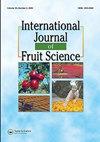Volatile Compound Production and Quality Characteristics of Durian Fruit Cv. Monthong as Affected by 1-methylcyclopropene and Modified Atmosphere Storage
IF 2.4
3区 农林科学
Q2 HORTICULTURE
引用次数: 0
Abstract
ABSTRACT This study aimed to evaluate the combined effects of 1-methylcyclopropene (1-MCP) and modified atmosphere (MA) storage on volatile compound production and quality parameters of durian fruit cv. Monthong during storage. Whole durian fruit harvested at the commercial maturity (75–80%) was fumigated with 0–1,000 nL L−1 of 1-MCP for 12 hours. The fruits were then kept in MA chamber fitted with a silicone membrane window at 15°C up to 4 weeks. Volatile aroma compounds including 3 sulfur compounds, 1 ester, 5 alcohols, and 1 ketone were monitored during durian fruit storage. The production of diethyl disulfide, 3,5-dimethyl-1,2,4-trithiolane (2 isomers) and ethyl-2-methyl butanoate was strongly suppressed by 1-MCP/MA treatment. Husk and pulp color changes, pulp softening, respiration rate, production of ethylene, and fermentative metabolites were effectively retarded with 1-MCP/MA technique. 1-MCP treatment at 500 nL L−1 for 12 h under MA condition could extend the storage life of Monthong durian fruit up to 3 weeks without any negative effect. Therefore, this combined technique could be applied to maintain quality and control the ripening process of Monthong durian fruit.榴莲果实挥发性化合物的生产及品质特性研究。1-甲基环丙烯和改性气调贮藏对月龄的影响
摘要本研究旨在评价1-甲基环丙烯(1-MCP)和改性气氛(MA)贮藏对榴莲果实挥发性化合物产量和品质参数的联合影响。储存期间为月。在商业成熟期(75-80%)收获的整个榴莲果实,用0-1,000 nL L−1的1- mcp熏蒸12小时。然后将果实保存在装有硅胶膜窗的MA室中,在15°C下保存4周。测定了榴莲果实贮藏过程中挥发性香气物质,包括3种硫化物、1种酯类、5种醇类和1种酮类。1-MCP/MA处理能显著抑制二硫二乙酯、3,5-二甲基-1,2,4-三硫烷(2个异构体)和2-甲基丁酸乙酯的生成。1-MCP/MA技术有效地延缓了果皮和果肉颜色的变化、果肉软化、呼吸速率、乙烯的产生和发酵代谢产物。1- mcp在500 nL L−1 MA条件下处理12 h,可使月通榴莲贮藏期延长3周,且无不良影响。因此,该技术可用于月通榴莲果实的品质保持和成熟过程控制。
本文章由计算机程序翻译,如有差异,请以英文原文为准。
求助全文
约1分钟内获得全文
求助全文
来源期刊

International Journal of Fruit Science
Agricultural and Biological Sciences-Agronomy and Crop Science
CiteScore
6.40
自引率
0.00%
发文量
64
审稿时长
10 weeks
期刊介绍:
The International Journal of Fruit Science disseminates results of current research that are immediately applicable to the grower, extension agent, and educator in a useful, legitimate, and scientific format. The focus of the journal is on new technologies and innovative approaches to the management and marketing of all types of fruits. It provides practical and fundamental information necessary for the superior growth and quality of fruit crops.
This journal examines fruit growing from a wide range of aspects, including:
-genetics and breeding
-pruning and training
-entomology, plant pathology, and weed science
-physiology and cultural practices
-marketing and economics
-fruit production, harvesting, and postharvest
 求助内容:
求助内容: 应助结果提醒方式:
应助结果提醒方式:


